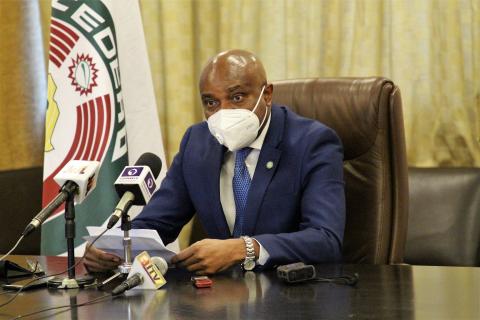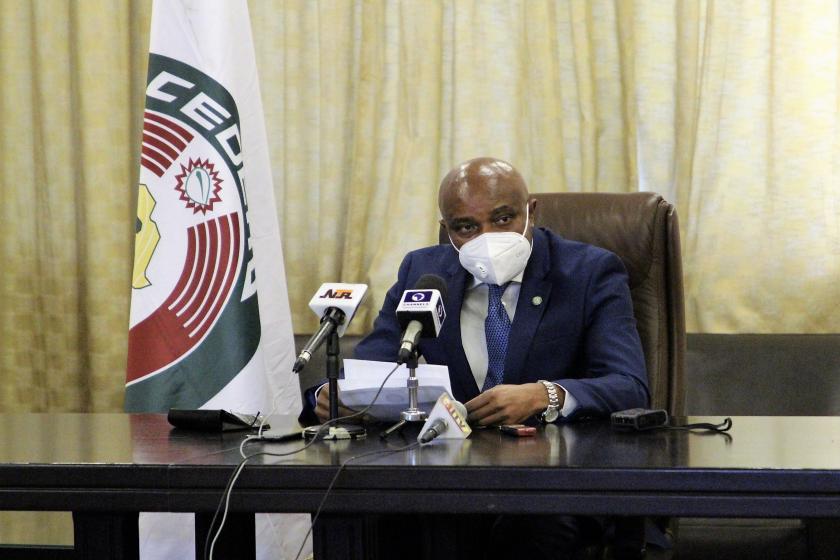
Commemorating WAHO 34rd Anniversary
The West African Health Organization (WAHO), the Health Institution of the Economic Community of West African States (ECOWAS) is commemorating the 34rd anniversary of its creation.
It was created by Protocol A/P2/7/87 of 9 July 1987 signed in Abuja by the Heads of State and Government.

Message on the occasion of the
34th WAHO Day
by Professor Stanley OKOLO,
Director General of WAHO
9 July 2021, the West Africa Health Organization commemorates 34 years of its existence, of which the past 18 months was the most challenging. As in other parts of the world, the ongoing global COVID-19 pandemic has had devastating health, social and economic impact on the population of West Africa. Since its inception, WAHO has worked closely with the 15 Ministries of Health of ECOWAS Member States, the Africa Regional Office of WHO and all key stakeholders, including more recently the Africa Centre for Disease Control, to drive its mandate of safeguarding and improving the health of the region’s citizens.
And despite recurrent disease outbreaks and epidemics that have challenged the fragile health systems in our region, WAHO has championed several health improvement programs including projects on reducing the number of women dying during childbirth and the number of children dying before the age of 5 years; projects on increasing local manufacture of high quality drugs; and projects on strengthening the region’s disease surveillance, preparedness and response architecture to ensure that infectious disease outbreaks are detected early and responded to robustly.
During the ongoing COVID-19 pandemic, WAHO has led the regional response efforts by facilitating coordination, collaboration and communication between Member States and between the region and international partners. We have provided over 100,000kg of critically needed medical materials such as laboratory diagnostic equipment and reagents, personal protective equipment (PPEs), and respiratory ventilators, to support Member States in their national efforts. Over 3000 healthcare personnel have been trained in various skills required for the COVID-19 response efforts in addition to targeted financial support to help Member States in specific areas of need, such as engagement of contact tracers or public health rapid response teams, or purchase of necessary equipment for surveillance or diagnosis.
As we mark this year’s WAHO Day therefore, it is important that we remember all our citizens that have died in the past year due to the COVID-19 pandemic, especially healthcare workers that have paid the ultimate price with their lives whilst at the forefront of the response to this devastating pandemic. May the souls of all the departed rest in perfect peace.
Today also offers us the opportunity to reflect on the continuing challenges we face in trying to improve the health of the region’s population. One lesson of the devastating 2014-2016 Ebola epidemic in our region was the need for an agency under WAHO dedicated specifically to surveillance, preparation and response to the recurrent epidemics in the region. Five years after the establishment of the ECOWAS Regional Centre for Surveillance and Disease Control (ECOWAS RCSDC) it is an issue of personal regret that the centre is not yet fully operational due to bureaucratic delays in the long running ECOWAS Institutional Reform program. WAHO therefore continues to lead the region’s health security agenda in addition to all the other burning health issues, such as malaria, non-communicable diseases, regional production of quality medicines, and universal health coverage.
Although the region has fared much better than predicted during the COVID-19 pandemic, the weaknesses in our health systems have been exposed, including weaknesses in infrastructure, human resources, and laboratory capacity, in addition to deficits in the levels of community engagement required for effective disease control. Governments and stakeholders must therefore resolve to strengthen national health systems, and to rebuild trust with our populations without whom public health measures will fail. It is within our power as individuals and groups to control this pandemic through social behavioral change, whilst we await availability of sufficient vaccine doses through international collaboration and ongoing discussions on establishing vaccine manufacturing facilities in the region.
WAHO is extremely grateful for the support of the Heads of State and Government of ECOWAS Member States, the Ministers of Health, and of our international partners as we continue in solidarity on the march to regional integration through health. We still have a lot of work to do, but I believe that working together, we will succeed.
Long live ECOWAS. Long live WAHO. Long live Regional Integration.
Footnote
The West Africa Health Organization (WAHO) was established in 1987 but became fully operational in 2000 when the first Director General was appointed. Over the years, WAHO has evolved to become a regional leader in health as it continues to deliver on its mandate as the Health Institution of the Economic Community of West African States (ECOWAS).
